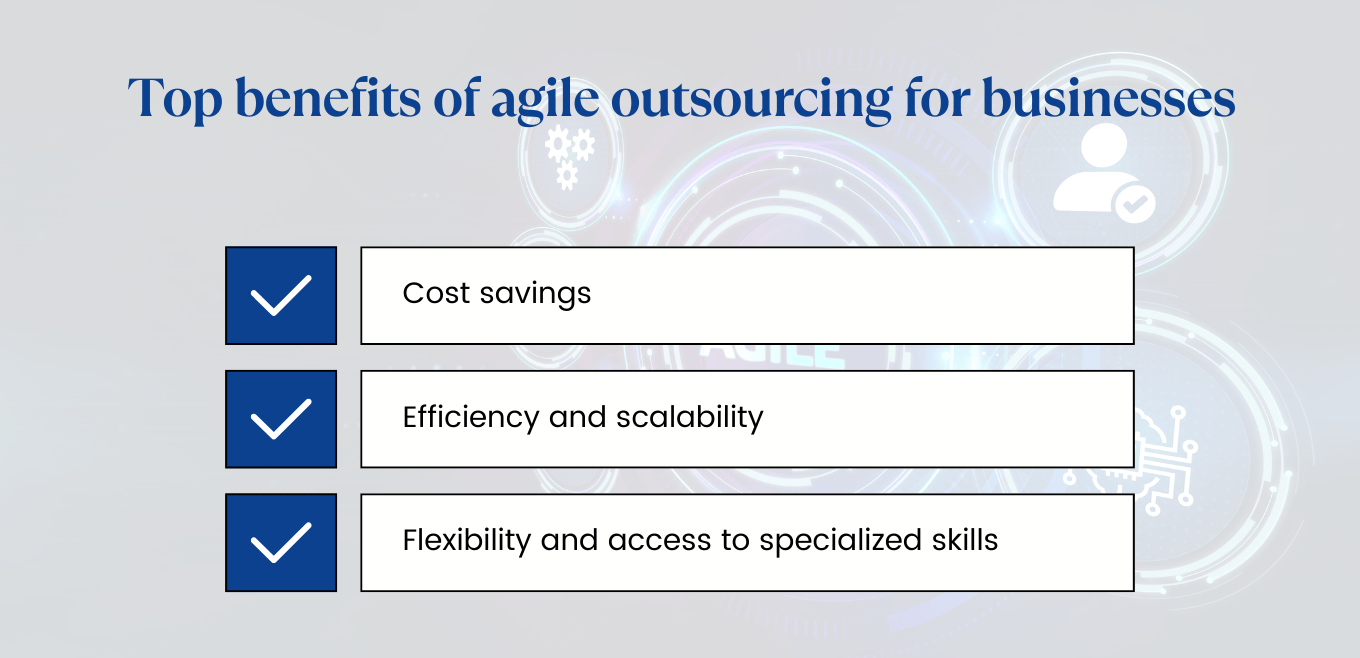In today’s dynamic software development landscape, agile methodologies have become essential for efficient and adaptable project management. Agile outsourcing partner prioritizes collaboration, flexibility, and iterative progress, enabling teams to quickly respond to evolving project requirements and deliver high-quality software solutions.
As agile practices have gained prominence, the demand for IT outsourcing has grown significantly. This shift underscores the reliance on external expertise and resources to support agile development. Agile software outsourcing has become a strategic solution for businesses aiming to leverage the benefits of agile methodologies while tapping into a global pool of talent and resources.
Key principles of agile methodology
A set of fundamental ideas that direct the software development process serves as the foundation for agile approaches. These principles include:
- Delivering software early and consistently to satisfy customers.
- Accepting change to provide the client with a competitive edge.
- Continuous cooperation between stakeholders and development teams.
- Regular and prompt delivery of functional software.
- Empowering and having faith in driven people.
- Information can be communicated most effectively face-to-face.
- Progress measurement using functional software.
- Keeping development teams moving at a sustainable pace.
Top benefits of agile outsourcing partner for businesses
In an increasingly competitive environment, businesses are constantly seeking ways to optimize their software development processes. Agile outsourcing has emerged as a popular strategy, offering significant advantages such as cost savings, enhanced efficiency, greater flexibility, and faster time-to-market. By leveraging external software development teams and tapping into global talent pools, companies can unlock substantial benefits.

- Cost savings: Agile outsourcing enables businesses to significantly reduce costs. Instead of maintaining an in-house development team, companies can lower overhead expenses by utilizing external software development teams. Additionally, outsourcing provides access to highly skilled professionals worldwide at a fraction of the cost of hiring locally, making it a cost-effective solution for businesses.
- Efficiency and scalability: Agile outsourcing enables companies to scale their software development efforts based on project requirements. With access to a flexible and scalable team of external developers, businesses can quickly adapt to changing demands, allocate resources efficiently, and deliver high-quality software products in less time. This adaptability allows for streamlined processes, increased productivity, and enhanced overall efficiency, making agile outsourcing a valuable asset in responding to evolving business needs and market conditions.
- Flexibility and access to specialized skills: In the rapidly evolving software development landscape, businesses often face skill gaps or require expertise in specific areas. Agile outsourcing offers the flexibility to bridge these gaps by providing access to specialized skills and technical expertise. By partnering with external software development teams, businesses can tap into a vast talent pool with diverse skill sets, ensuring that project requirements are met with the highest level of proficiency. This approach enhances a company’s technical capabilities and allows for more effective execution of complex projects.
In today’s competitive landscape, speed is crucial. Agile outsourcing helps businesses meet tight deadlines and accelerate their time-to-market. By partnering with skilled and efficient external development teams, companies can benefit from faster development cycles, rapid prototyping, and iterative feedback loops. This agile approach ensures that software products are delivered to market more quickly, enabling businesses to capitalize on opportunities and gain a competitive edge.
Agile is typically most effective in teams that have close communication and respond quickly to changes. However, this can be difficult when working with an external team that may be located far away. However, outsourcing and Agile can coexist peacefully with the correct strategy.
Let’s talk about the important things to consider while selecting an Agile outsourcing partner.
Key considerations for choosing the right agile outsourcing partner
Selecting the right agile outsourcing partner is critical for ensuring the success of your software development project and aligning with your company’s values and objectives. The following key factors should be considered when evaluating potential partners:
- Agile methodologies expertise: Look for a partner with deep experience in agile software development. They should be well-versed in agile frameworks, practices, and principles, such as Scrum and Kanban, to ensure they can adapt to the iterative and flexible nature of agile projects.
- Track record of successful projects: Evaluate the agile outsourcing partner’s previous successes by reviewing their portfolio of completed projects. This will help you gauge their ability to consistently deliver high-quality software on time and within budget.
- Cultural fit: Ensure the prospective partner’s corporate culture aligns with your own. A strong cultural fit promotes seamless collaboration, shared values, and effective communication throughout the project.
- Communication skills: Clear and efficient communication is essential for the success of any outsourcing relationship. Assess the partner’s communication channels, responsiveness, and language proficiency to ensure smooth coordination and minimize misunderstandings.
- Security measures: Data security is paramount in outsourced projects. Review the partner’s cybersecurity practices, policies, and compliance with industry standards to ensure the protection of your sensitive information.
Conducting thorough due diligence is essential when evaluating potential agile outsourcing partners. Request case studies, conduct in-depth interviews, and seek references from previous clients to gain a comprehensive understanding of their capabilities. Utilizing a Vendor Evaluation Checklist can help ensure that all critical factors are considered during the assessment process. By selecting the right partner, you can fully leverage their expertise and experience to maximize the benefits of agile outsourcing for your business.
Take your first step towards agile excellence and scale as per custom business needs
How to implement agile practices in outsourced projects
Take into account the following to successfully apply agile practices in outsourced projects:
- Create efficient communication channels: promoting cooperation between internal and external teams requires clear, open channels of communication. make use of technologies such as email, video conferencing, and project management software to facilitate smooth communication and information exchange.
- Establish explicit project goals and priorities: establish explicit project goals and priorities right away. ensure that the goals, deliverables, and schedules of the project are understood by both teams. organizing work by segmenting it into smaller, more manageable user stories can help with focus and clarity.
- Foster collaboration: Encourage teamwork and a sense of shared responsibility among team members. Call regular meetings to discuss progress, resolve issues, and coordinate efforts, such as sprint reviews or daily stand-ups. Encourage the creation of an atmosphere where suggestions, comments, and ideas are freely accepted.
- Manage common challenges: Language hurdles, cultural differences, and time zone variations are just a few of the special difficulties that outsourcing projects may bring. Take proactive steps to overcome these obstacles by creating efficient communication plans, offering lucid documentation, and encouraging cross-cultural understanding among the teams.
- Iterate and adapt: Agile methodologies place a strong emphasis on flexibility and ongoing development. Evaluate the project’s progress on a regular basis, get input from stakeholders, and make any required modifications. To keep the project in line with changing requirements, promote iteration and embrace change.
You can ensure successful outcomes and overcome the inherent challenges of outsourcing projects by putting these agile practices into practice. Recall that in an outsourced setting, efficient teamwork and transparent communication are essential to agile project management.
Looking for experts in Agile software development outsourcing?
Conclusion
Outsourcing agile software development offers significant advantages to businesses, including greater flexibility, faster time-to-market, and enhanced customer satisfaction through agile practices. Agile projects’ incremental and iterative nature allows companies to deliver high-quality software while adapting to evolving requirements.
However, selecting the right outsourcing partner is crucial to realize these benefits fully. Key factors to consider include the partner’s communication capabilities, security protocols, cultural alignment, experience with agile methodologies, and a proven track record of successful projects. Building strong partnerships and maintaining transparent communication are essential for successful collaboration in agile outsourcing.
If you’re considering outsourcing your software development, explore People10’s software development outsourcing services to find a trusted partner.



